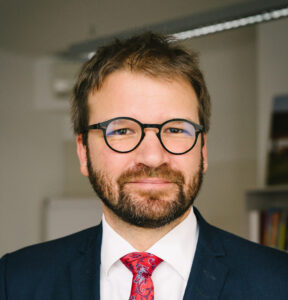Healthy Europe asked four prominent decision-makers whether the social contract and solidarity in general is under threat in Europe and about their vision for health and society for 2040. Valentina Prevolnik Rupel, Minister of Health of the Republic of Slovenia, Ulrike Königsberger-Ludwig, State Secretary, Ministry of Labour, Social Affairs, Health, Care and Consumer Protection of Austria, Herwig Ostermann, Executive Director of Gesundheit Österreich GmbH, and Natasha Azzopardi-Muscat, Director of the Division of Country Health Policies and Systems of WHO/Europe responded.

Valentina Prevolnik Rupel, Minister of Health of the Republic of Slovenia
In recent years, the world has experienced a series of profound social, economic and geopolitical shocks, ranging from financial crises and the COVID-19 pandemic to armed conflicts, climate change and natural disasters. These disruptions have been further compounded by long-term trends such as demographic shifts, workforce shortages, migration and ongoing geopolitical instability. Consequently, public institutions and social systems are under growing strain, as is the very foundation of our democratic societies. The European social contract and the principle of solidarity are being tested, and citizens across the continent are voicing increasing concern about unequal access to essential services, growing social disparities, and declining trust in institutions and governance.
Public institutions and social systems are under growing strain.
To address these complex challenges, we must reaffirm our commitment to the core values that underpin the European social model – equity and solidarity. The health sector has a pivotal role to play in this renewal. A strong, inclusive health system not only fosters public trust but also reduces inequalities and strengthens social cohesion, laying the groundwork for opportunity and wellbeing for all. Looking ahead to 2040, I envision a Europe where health is embraced as both a shared value and a shared responsibility – a cornerstone of inclusive, resilient and forward-looking societies. In this vision, social participation and citizen engagement in health are recognised not just as democratic ideals but as practical tools for better policymaking, smarter investment and more sustainable outcomes. If we succeed, health will no longer be seen merely as a service to be delivered, but as a vital foundation for renewing and strengthening the European social contract.

Ulrike Königsberger-Ludwig, State Secretary, Ministry of Labour, Social Affairs, Health, Care and Consumer Protection of Austria
Demographic change and globalisation are societal developments that fundamentally alter the healthcare system. At the same time, they also contribute to an increasing polarisation of health policy debates. I am an advocate for the public healthcare system, and I also see that all social partners and stakeholders share the common goal of strengthening the soldarity-based system. Therefore, existing resources must be used in the best possible way – also with regard to sustainability, as the healthcare system must be fit for the future and for future generations. The challenges are manifold and involve both finances and personnel: the increasing demand for doctors and healthcare personnel due to demographic change, as well as changed life expectations, are further points that need to be considered in future planning. In addition, low-threshold and locally accessible care is gaining in importance.
Low-threshold and locally accessible care is gaining in importance.
Our declared goal must be to sustainably improve the quality of life into old age through a solidarity-based health system. This can be achieved, for example, through prevention rather than medicine that focuses on repair, by strengthening people’s own health competence and, of course, through the expansion of primary care. However, this requires sufficient personnel, which is why we want to create an appropriate incentive system to encourage medical graduates to work in this solidary health system. Our vision is therefore clear: we are committed to ensuring that all people in Austria receive the best medical care and that we provide the best living conditions for all generations from the very beginning.

Herwig Ostermann, Executive Director of Gesundheit Österreich GmbH
The social contract is an agreement in which the state guarantees protection, social security and participation. In return, the citizens adhere to the laws and pay taxes and contributions based on their financial capabilities. Over recent years, the social contract has been increasingly called into question in many European states. Growing social inequalities, the uncertainty caused by globalisation and digitalisation, as well as populism and political fragmentation, have weakened trust in the state and its institutions.
A high-quality public health system encourages social cohesion.
In order to regain this trust, we have to communicate more clearly that the social contract and solidarity-based systems ultimately benefit everyone. We have to achieve social equity, make the political processes transparent, participative and inclusive, and also invest in education, infrastructure and the health sector. The latter is a central pillar of the social contract. A high-quality public health system that can be accessed by everyone increases trust in the state institutions and encourages social cohesion. Together with the other social security systems, we must work on continuously developing our health systems and adapting them to the changing demands from an ageing population and new technologies. And this is the basis of my vision for 2040: a public health system that is so good, the very idea of opting for private is considered unnecessary.

Natasha Azzopardi-Muscat, Director of the Division of Country Health Policies and Systems of WHO/Europe
To me, the social contract reflects a willingness to live by shared values that prioritise community wellbeing over individual gain. In healthcare, citizens accept taxes in exchange for access to quality services, and professionals serve society altruistically for status, autonomy and reward. But this delicate contract is under threat. A growing focus on individual needs dominates discourse, fuelling populist promises and eroding trust in public systems. Misinformation – often politically or financially driven – is undermining confidence in health services. Tackling this must be a priority. Social media and tech giants amplify isolation and unrealistic expectations, especially among youth.
This moment calls for bold joint choices to rebuild trust.
Cooperation is both my greatest fear and hope. Across the WHO European Region, we share more than divides us, and this moment calls for bold joint choices to rebuild trust. That means confronting tech giants that host harmful content; resisting anti-regulatory backlash; and tackling health-harming products. All of this is demanding cooperation and it isn’t idealism – it’s survival. The social contract is fraying because people no longer see value in the exchange. Under-funded services breed disillusionment. Voters, especially youth, are drawn to populists out of frustration. This is the ground we must reclaim – by speaking honestly, acting boldly and delivering real improvements. By 2040, we’ll either be a poorer, divided Europe or a renewed society balancing growth, strength and solidarity.
